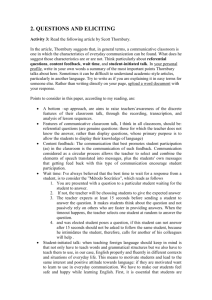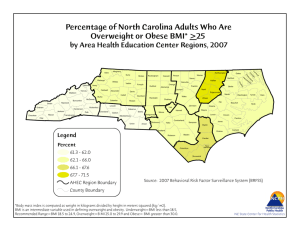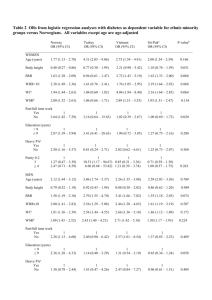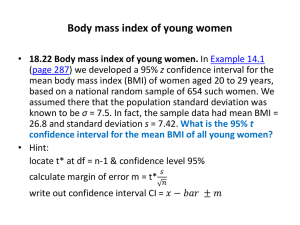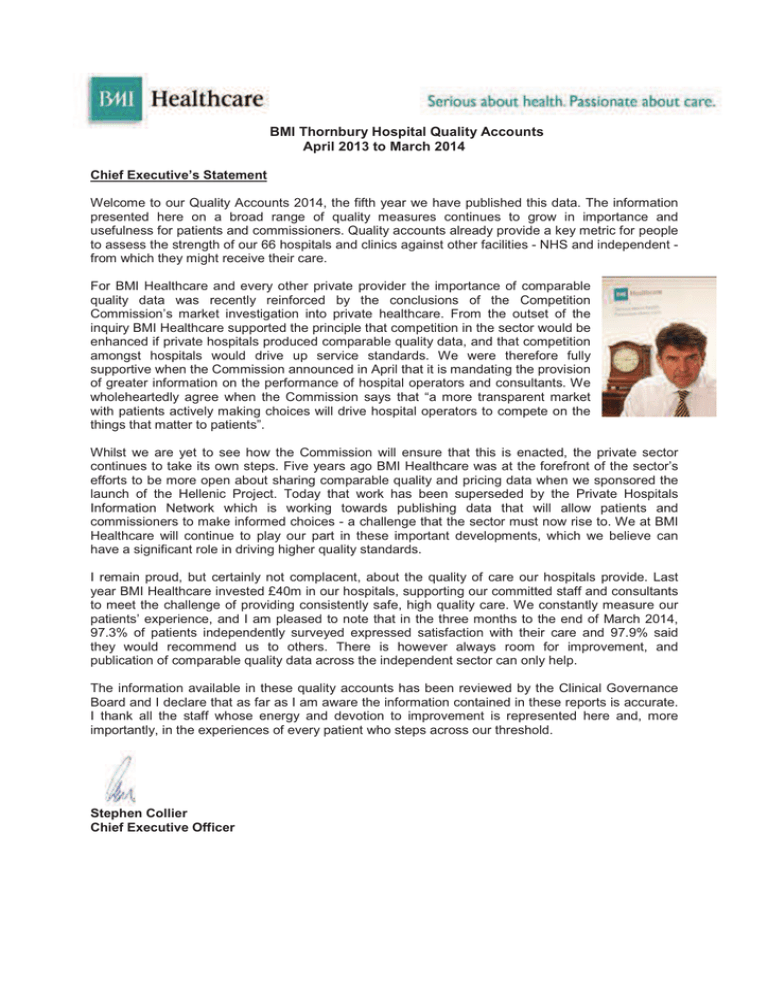
BMI Thornbury Hospital Quality Accounts
April 2013 to March 2014
Chief Executive’s Statement
Welcome to our Quality Accounts 2014, the fifth year we have published this data. The information
presented here on a broad range of quality measures continues to grow in importance and
usefulness for patients and commissioners. Quality accounts already provide a key metric for people
to assess the strength of our 66 hospitals and clinics against other facilities - NHS and independent from which they might receive their care.
For BMI Healthcare and every other private provider the importance of comparable
quality data was recently reinforced by the conclusions of the Competition
Commission’s market investigation into private healthcare. From the outset of the
inquiry BMI Healthcare supported the principle that competition in the sector would be
enhanced if private hospitals produced comparable quality data, and that competition
amongst hospitals would drive up service standards. We were therefore fully
supportive when the Commission announced in April that it is mandating the provision
of greater information on the performance of hospital operators and consultants. We
wholeheartedly agree when the Commission says that “a more transparent market
with patients actively making choices will drive hospital operators to compete on the
things that matter to patients”.
Whilst we are yet to see how the Commission will ensure that this is enacted, the private sector
continues to take its own steps. Five years ago BMI Healthcare was at the forefront of the sector’s
efforts to be more open about sharing comparable quality and pricing data when we sponsored the
launch of the Hellenic Project. Today that work has been superseded by the Private Hospitals
Information Network which is working towards publishing data that will allow patients and
commissioners to make informed choices - a challenge that the sector must now rise to. We at BMI
Healthcare will continue to play our part in these important developments, which we believe can
have a significant role in driving higher quality standards.
I remain proud, but certainly not complacent, about the quality of care our hospitals provide. Last
year BMI Healthcare invested £40m in our hospitals, supporting our committed staff and consultants
to meet the challenge of providing consistently safe, high quality care. We constantly measure our
patients’ experience, and I am pleased to note that in the three months to the end of March 2014,
97.3% of patients independently surveyed expressed satisfaction with their care and 97.9% said
they would recommend us to others. There is however always room for improvement, and
publication of comparable quality data across the independent sector can only help.
The information available in these quality accounts has been reviewed by the Clinical Governance
Board and I declare that as far as I am aware the information contained in these reports is accurate.
I thank all the staff whose energy and devotion to improvement is represented here and, more
importantly, in the experiences of every patient who steps across our threshold.
Stephen Collier
Chief Executive Officer
Hospital Information
BMI Thornbury Hospital has 72 beds and cares for adults and children undergoing a wide range
of surgical procedures and those requiring other medical intervention. We have a dedicated
Oncology unit, a full range of Imaging Services including one of six Gamma Knives in the UK. In
October 2013 the hospital installed & commissioned a new 161 slice CT scanner and further
investment includes the installation & commissioning of a state-of-art MRI scanner in Autumn
2014. BMI Thornbury offers a Level Two Plus Critical Care facility for those patients requiring
additional monitoring. A list of other services include Health Screening, Fertility, Gynaecology,
Ophthalmology, Bariatric Surgery, Cardiology, Cosmetic Surgery, Endoscopy and Orthopaedics
to name but a few. BMI Thornbury Hospital has over 250 Consultants with practicing privileges
across a number of specialties who operate within the hospital utilizing both the inpatient and
outpatient facilities. BMI Thornbury Hospital offers a limited service for children but works well
with the Sheffield Children’s Hospital to ensure that the correct clinical pathway can be achieved
The hospital works very closely with the local NHS Trusts and 53% of BMI Thornbury’s business
is supporting and treating NHS patients. BMI Thornbury Hospital works in a transparent way
with its key stakeholders and can demonstrate a good working relationship with them.
The hospital has a robust Clinical Governance structure to ensure that patient safety is at the
forefront of everything we do. This links in with both the companies governance strategy and
governmental agendas and we have full engagement from the Medical Advisory Committee.
BMI Healthcare are registered as a provider with the Care Quality Commission (CQC) under the
Health & Social Care Act 2008. BMI Thornbury Hospital is registered as a location for the
following regulated services:•
•
•
•
Treatment of disease, disorder and injury
Surgical procedures
Diagnostic and screening
Family Planning
The CQC carried out an unannounced inspection on the 9th December 2013 and found the
following:
These are the results of our most recent checks showing whether this care service is meeting
each of the standards that the government says you have the right to expect. These outcomes
were the 5 chosen to be audited at the last inspection.
1 Treating people with respect and involving them in their care
Overall
2 Providing care, treatment and support that meets people's needs
Overall
3 Caring for people safely and protecting them from harm
Overall
4 Staffing
Overall
5 Quality and suitability of management
Overall
BMI Thornbury Hospital has a local framework through which clinical effectiveness, clinical
incidents and clinical quality is monitored and analysed. Where appropriate, action is taken to
continuously improve the quality of care. This is through the work of a multidisciplinary group
and the Medical Advisory Committee.
Regional Clinical Quality Assurance Groups monitor and analyse trends and ensure that the
quality improvements are operationalised. 2013 saw a continuation of CQIUNS and achieved in
excess of 95% compliance for VTE & WHO checklist and with a continued reduction in clinical
complaints and HAI rates remain negligible.
At corporate level the Clinical Governance Board has an overview and provides the strategic
leadership for corporate learning and quality improvement.
There has been ongoing focus on robust reporting of all incidents, near misses and outcomes.
Data quality has been improved by ongoing training and database improvements. New reporting
modules have increased the speed at which reports are available and the range of fields for
analysis. This ensures the availability of information for effective clinical governance with
implementation of appropriate actions to prevent recurrences in order to improve quality and
safety for patients, visitors and staff.
At present we provide full, standardised information to the NHS, including coding of procedures,
diagnoses and co-morbidities and PROMs for NHS patients.There are additional external
reporting requirements for CQC, Public Health England (Previously HPA) CCGs and Insurers.
BMI is a founding member of the Private Healthcare Information Network (PHIN) UK – where
we produce a data set of all patient episodes approaching HES-equivalency and submit this to
PHIN for publication. The data is made available to common standards for inclusion in
comparative metrics, and is published on the PHIN website http://www.phin.org.uk. This website
gives patients information to help them choose or find out more about an independent hospital
including the ability to search by location and procedure.
1. Safety
1.1 Infection prevention and control
The focus on infection prevention and control continues under
the leadership of the Group Head of Infection Prevention and
Control, in liaison with the link nurse in BMI Thornbury Hospital.
The focus on infection prevention and control continues under
the leadership of the Group Director of Infection Prevention and
Control and Group Head of Infection Prevention and Control, in
liaison with the Infection Prevention and Control Lead BMI
Thornbury Hospital.
We have had: 0 cases of MRSA bacteraemias
0 cases of MSSA bacteraemias
0 cases of e. Coli bacteraemias
0 cases of Hospital acquired Clostridium Difficile in the last 12 months
SSI data collection and submission to Public health England for hip and knee replacement
surgery started in July 2013.
Infection rates for these types of surgery :Hips – 5
Knees – 4
Departmental audits are carried out by the infection control lead, following the Infection
prevention Society’s Quality Improvement tools. 2013 – 2014, saw 9 departments audited, with
the majority scoring 90% or above. Those departments scoring below the acceptable 90% mark
were re audited within 6 weeks, and vast improvement was seen following deep cleaning and
general maintenance work.
High impact intervention Care bundles have been implemented for insertion of and care of
peripheral lines, insertion and care of central lines, insertion and care of catheters, pre op care
and post op care. These are audited on a monthly basis by the infection control lead. 100%
compliance is seen in all bundles except care of peripheral lines. Improvement in this bundle
has been seen following education and training, with a score currently of 80%.
Environmental cleanliness is also an important factor in infection prevention and our patients
rate the cleanliness of our facilities highly.
1.2 Patient Led Assessment of the Care Environment (PLACE)
BMI Thornbury Hospital PLACE audits took place on the 1st May 2014 with very positive
feedback. The main recommendation was that the hospital needed to be mindful of providing
signage that reflected the local population.
We believe a patient should be cared for with compassion and dignity in a clean, safe environment.
Where standards fall short, they should be able to draw it to the attention of managers and hold the
service to account. PLACE assessments will provide motivation for improvement by providing a clear
message, directly from patients, about how the environment or services might be enhanced.
In 2013 we introduced PLACE, which is the new system for assessing the quality of the patient
environment, replacing the old Patient Environment Action Team (PEAT) inspections.
The assessments involve patients and staff who assess the hospital and how the environment
supports patient’s privacy and dignity, food, cleanliness and general building maintenance. It focuses
entirely on the care environment and does not cover clinical care provision or how well staff are
doing their job.
The results will show how hospitals are performing nationally and locally.
1.3 Venous Thrombo-embolism (VTE)
BMI Healthcare, holds VTE Exemplar Centre status by the Department of Health across its
whole network of hospitals including, BMI Thornbury Hospital. BMI Healthcare was awarded the
Best VTE Education Initiative Award category by Lifeblood in February 2013 and were the
Runners up in the Best VTE Patient Information category. BMI Thornbury Hospital consistently
score in excess of 95% compliance with no patients re-admitted with DVT following surgery.
We see this as an important initiative to further assure patient safety and care. We audit our
compliance with our requirement to VTE risk assess every patient who is admitted to our facility
and the results of the audit shows continued compliance over the year. BMI as a group has
achieved VTE exemplar status again this year and compliance will remain high on the agenda
at site.
BMI Thornbury Hospital reports the incidence of Venous Thromboembolism (VTE) through the
corporate clinical incident system. It is acknowledged that the challenge is receiving information
for patients who may return to their GPs or other hospitals for diagnosis and/or treatment of VTE
post discharge from the Hospital. As such we may not be made aware of them. We continue to
work with our Consultants and referrers in order to ensure that we have as much data as
possible. .
BMI Thornbury Hospital has no incidents of VTE over the previous 12 months.
2. Effectiveness
2.1 Patient reported Outcomes (PROMS)
Patient Reported Outcome Measures (PROMs) are a means of collecting information on the
effectiveness of care delivered to NHS patients as perceived by the patients themselves.
PROMs is a Department of Health led programme.
Latest results can be found by going on the online SOLAR system provided to you by Quality
Health
For the current reporting period, the table below demonstrate that the health gain between
Questionnaire 1 (pre-operative) and Questionnaire 2 (post–operative) for patients undergoing
hip replacement surgery at BMI Thornbury Hospital.
Oxford Hip Score average
2013/14
Q1
Q2
Health gain (Q2 - Q1 average)
19.625
41.75
22.125
17.907
39.224
21.317
Hospital
England
Copyright © 2013, The Health and Social Care Information Centre. All Rights Reserved.
2.2 Enhanced Recovery Programme (ERP)
The ERP is about improving patient outcomes and speeding up a patient’s recovery after
surgery. ERP focuses on making sure patients are active participants in their own recovery and
always receive evidence based care at the right time. It is often referred to as rapid recovery, is
a new, evidence-based model of care that creates fitter patients who recover faster from major
surgery. It is the modern way for treating patients where day surgery is not appropriate.
ERP is based on the following principles:1. All Patients are on a pathway of care
a. Following best practice models of evidenced based care
b. Reduced length of stay
2. Patient Preparation
a. Pre Admission assessment undertaken
b. Group Education sessions
c. Optimizing the patient prior to admission – i.e HB optimisation, control comorbidities, medication assessment – stopping medication plan.
d. Commencement of discharge planning
3. Proactive patient management
a. Maintaining good pre-operative hydration
b. Minimising the risk of post-operative nausea and vomiting
c. Maintaining normothermia pre and post operatively
d. Early mobilisation
4. Encouraging patients have an active role in their recovery
a. Participate in the decision making process prior to surgery
b. Education of patient and family
c. Setting own goals daily
d. Participate in their discharge planning
Early Mobilisation
The average length of stay at BMI Thornbury Hospital is 2.5 days with patients being seen by a
physiotherapist and mobilised when clinically appropriate, within hours of surgery. This has
proven to significantly reduce the risk of developing a DVT or post-op complications.
Carbohydrate Pre-Loading
A speedy recovery is dependent on a patient being in optimal condition prior to surgery and this
includes being well nourished and therefore some patients are eligible for carbohydrate preloading.
ERP focuses on many elements but these 2 are our main focus of attention.
2.3 Unplanned Readmissions within 31 days and unplanned returns to theatre.
Unplanned readmissions and unplanned returns to theatre are normally due to a clinical
complication related to the original surgery. The number of re-admissions to BMI Thornbury
Hospital in the period 01/04/2013 – 30/04/2014 was 8
3. Patient experience
3.1 Patient satisfaction
BMI Healthcare is committed to providing the highest levels of quality of care to all of our
patients. We continually monitor how we are performing by asking patients to complete a patient
satisfaction questionnaire. Patient satisfaction surveys are administered by an independent third
party. The supplier for this questionnaire was changed form Howard Warwick to Quality Health
in the autumn and therefore you will notice that ther is no data for the months of November and
December.
3.2 Complaints
In addition to providing all patients with an opportunity to complete a satisfaction survey BMI
Thornbury Hospital actively encourages feedback both informally and formally. Patients are
supported through a robust complaints procedure, operated over three stages:
Stage 1: Hospital resolution
Stage 2: Corporate resolution
Stage 3: Patients can refer their complaint to independent adjudication if they are not satisfied
with the outcome at the other 2 stages.
ϳ
ϲ
ĐůŝŶŝĐĂů
ϱ
ŶŽŶĐůŝŶŝĐĂů
ŵŝdžĞĚĐŽŵƉůĂŝŶƚ
ϰ
ϯ
Ϯ
ϭ
Ϭ
ĐůŝŶŝĐĂů
ŶŽŶ
ĐůŝŶŝĐĂů
ŵŝdžĞĚ
DĂLJͲ :ƵŶͲ
ϭϯ
ϭϯ
ϯ ϯ
:ƵůͲ
ϭϯ
ϭ
ƵŐͲ
ϭϯ
ϭ
^ĞƉͲ
ϭϯ
ϯ
KĐƚͲ
ϭϯ
ϯ
ϯ
ϯ
ϯ
ϲ
Ϯ
EŽǀͲ ĞĐͲ
ϭϯ
ϭϯ
Ϯ ϱ
ϯ
ϭ
ϭ
:ĂŶͲ
ϭϰ
ϱ
&ĞďͲ
ϭϰ
ϰ
ϯ
ϰ
ϱ
ϱ
DĂƌͲ
ϭϰ
ϯ
ϱ
ϭ ƉƌͲ
ϭϰ
ϯ
Ϯ
4. CQUINS
CQUINs compliance over the year has remained stable with 2.22% of the 2.50% CQUINS
target achieved overall. Internal audit has supported this process with full buy in from the
Clinicians and surgeons. A noted dip in WHO compliance coincided with the issue of new
paperwork. Staff were re-educated and compliance achieved. WHO checklists were
maintained throughout the introduction but staff were not fully aware of the requirements for
compliant documentation. Training was implemented & WHO compliance was achieved. Hip and Knee pathway is good and work continues to further develop with particular
attention on the Enhanced Recovery Programme for this group. In line with the HPA, BMI
Thornbury Hospital has implementing the Surgical Site Infection monitoring for this group.
5. National Clinical Audits
BMI Thornbury Hospital was only eligible to participate in National Joint Registry audit and
all joint replacements are submitted to this. BMI Thornbury Hospital data is from the current
2014 NJR report.
BMI Thornbury Hospital
Submission figures for this hospital
Totals for this hospital
Total completed ops
Hip procedures
Knee procedures
Ankle procedures
Elbow procedures
Shoulder procedures
NJR consent rate
2013
653
336
302
3
0
12
100%
Year to date:
2014
199
108
86
0
0
5
100%
Copyright © 2008 - 2014 National Joint Registry
Terms and conditions Privacy policy Login
6. Research
No NHS patients were recruited to take part in research.
7. Priorities for service development and improvement
BMI Thornbury Hospital continues to focus on providing an excellent Quality of service to all of
its patients and providing harm-free care to all of its service users. The objective is to get it right
first time, every time.
BMI Thornbury Hospital has embraced the 6C’s across the hospital as the underpinning
principle for all of its care and service delivery.
Priorities for service development and improvement include:
•
Orthopaedics remains the largest speciality and sees continued growth across all areas. In
addition to focusing on the ERP programme and Surgical Site Infection, Thornbury hospital
is developing a number of services around revision hip replacement surgery, spinal
excellence & MSK services.
•
Over the past 6 months BMI Thornbury commenced Phase 1 of Process Improvement plan.
The programme is being rolled out across BMI. Process Improvement is a review of current
working processes in all areas in order to achieve efficiencies within the patient journey.
The intention is to improve the delivery of care through improved processes that are
sustainable. Six months into implementation the most noticeable improvement has been
staff engagement through enhanced and effective communication. Creative problem solving
sessions provide a forum for all staff to be engaged and own both the problem and the
solution. Full visual management and a focus on the patient journey.
•
BMI Thornbury Oncology continues and offers treatment pathways that are not always
available on the NHS. Gamma Knife services continues to give patients a good quality of life
with minimal side effects following treatment. This continues to be promoted within BMI and
national.
•
The recent introduction of EVLA (Endo-venous laser) for varicose veins.
services not provided within the NHS.
•
In October 2013 a new 161 slice CT scanner was installed giving consultants the
reassurance of improved images, reporting and diagnosis for their patients. This has also
given the added benefit of cardiac scanning capability. Autumn 2014 will see the installation
of a new MRI scanner.
•
BMI Thornbury Hospital has worked hard over the last year with a continued focus on
Patient Safety and Governance. One focus in particular was to increase significantly our
scores relating to a number of things such as Intraoperative care bundles, Peripheral
cannula and urinary catheter care. Regular audits have been undertaken and continue with
significant improvements made from an initial compliance for peripheral cannulas at 18% to
consistently achieving above 90%. Please note that the low score was due to poor
documentation and not poor care. Urinary Catheter compliance is now at 98% or above and
the intraoperative care bundle also sits at consistently above 96%.
•
The PLACE audit was a success with very positive feedback from the auditors. This has
been uploaded onto the system so the results will be published.
.
Enhancing
8. Mandatory Quality Indicators
8.1 The value and banding of the summary hospital-level mortality indicator (SHMI) for the BMI
Thornbury Hospital for the reporting period.
Unit
Reporting Periods
(at least last two
reporting periods)
National
Average
Highest National
Score
Lowest National
Score
0
Oct 2013 – June 2014
1.0006
1.1822
0.6735
8.2 The BMI Thornbury Hospital’s patient reported outcome measures scores for
(i) Groin hernia surgery
Unit
0
Reporting Periods
(at least last two
reporting periods)
April 13– March 14
National
Average
Highest National
Score
Lowest National
Score
0.083
0.157
0.014
BMI Thornbury Hospital considers that this data is as described for the following reasons:
This is a comparable score with the National Average but could be improved by reviewing the
post discharge pathway with input from the physiotherapy team.
(ii) Hip replacement surgery
Unit
23.2
Reporting Periods
(at least last two
reporting periods)
April 13 – March 14
National
Average
Highest National
Score
Lowest National
Score
21.280
24.684
17.214
BMI Thornbury Hospital considers that this data is as described for the following reasons:
With an above national average score the enhanced recovery programme at the hospital is
contributing to good patient outcomes, this programme will continue to be developed further.
The Enhanced Recovery Programme forms part of our CQUIN’s for this year.
(iii) Knee replacement surgery during the reporting period.
Unit
19.9
Reporting Periods
(at least last two
reporting periods)
April 13 – March 14
National
Average
Highest National
Score
Lowest National
Score
15.99
20.37
12.2
BMI Thornbury Hospital considers that this data is as described for the following reason:
With an above national average score the enhanced recovery programme at the hospital is
contributing to good patient outcomes, this programme will continue to be developed further.
The Enhanced Recovery Programme forms part of our CQUIN’s for this year.
8.3 (i) The percentage of patients aged 0-14 readmitted to a hospital which forms part of the
BMI Thornbury Hospital within 28 days of being discharged from a hospital which forms part of
the hospital during the reporting period.
Unit
0
Reporting Periods
(at least last two
reporting periods)
April 2013 – March 14
National
Average
Highest National
Score
Lowest National
Score
11.45
14.35
7.96
BMI Thornbury Hospital considers that this data is as described for the following reasons:
Good pre-assessment screening by an RSCN and post-anaesthetic care results in a zero
readmission rate. There are no complex paediatric cases and all cases are elective procedures
on healthy children.
8.3.(ii)The percentage of patients aged 15 or over readmitted to a hospital which forms part of
BMI Thornbury Hospital within 28 days of being discharged from a hospital which forms part of
the hospital during the reporting period.
Unit
7.4
Reporting Periods
(at least last two
reporting periods)
April 2013 – March 14
National
Average
Highest National
Score
Lowest National
Score
10.01
14.51
5.54
BMI Thornbury Hospital considers that this data is as described for the following reasons:
Good pre-assessment screening by a registered nurse and post-anaesthetic care results in a
low readmission rate.
8.4 BMI Thornbury Hospital responsiveness to the personal needs of its patients during the
reporting period.
Unit
72.3
Reporting Periods
(at least last two
reporting periods)
2013 -2014
National
Average
Highest National
Score
Lowest National
Score
68.1
84.4
57.4
BMI Thornbury Hospital considers that this data is as described for the following reasons :
A focus on providing a high standard of customer care to all our patients results in high levels of
patient satisfaction.
8.5 The percentage of patients who were admitted to BMI Thornbury Hospital and who were risk
assessed for venous thromboembolism during the reporting period.
Unit
100
Reporting Periods
(at least last two
reporting periods)
April 13 – Jan
14
National
Average
Highest National
Score
Lowest National
Score
96
100
79
BMI Thornbury Hospital considers that this data is as described for the following reasons:
A dedicated team of skilled nurses receive regular training on the prevention of VTE following
surgery and monthly audits are carried out to ensure continued compliance
8.6 The rate per 100,000 bed days of cases of C Difficile infection reported within the BMI
Thornbury Hospital amongst patients aged 2 or over during the reporting period.
Unit
0
Reporting Periods
(at least last two
reporting periods)
April 13 – March 14
National
Average
Highest National
Score
Lowest National
Score
17.3
30.8
0
BMI Thornbury Hospital considers that this data is as described for the following reasons :
There is a dedicated infection control nurse who delivers regular training throughout the
hospital. The patient bedrooms and bathrooms are single patients use and hand washing
facilities are readily available with education on hand washing techniques displayed throughout
the hospital.
8.7 The number and, where available, rate of patient safety incidents reported within the BMI
Thornbury Hospital during the reporting period, and the number and percentage of such patient
safety incidents that resulted in severe harm or death.
Number of patient safety incidents reported
Unit
1
Reporting Periods
(at least last two
reporting periods)
April 13 – March 14
National
Average
Highest National
Score
Lowest National
Score
44.55
1.810
0
National
Average
Highest National
Score
Lowest National
Score
7.76
30.95
1.68
Rate of patient safety incidents reported
Unit
1
Reporting Periods
(at least last two
reporting periods)
April 13 – March 14
Number of patient safety incidents that resulted in severe harm or death
Unit
0
Reporting Periods
(at least last two
reporting periods)
April 13 – March 14
National
Average
Highest National
Score
Lowest National
Score
0.64
2.8
0
Percentage of patient safety incidents that resulted in severe harm or death
Unit
0
Reporting Periods
(at least last two
reporting periods)
April 13 – March 14
National
Average
Highest National
Score
Lowest National
Score
0.9
2.9
0.0
BMI Thornbury Hospitals considers that this data is as described for the following reasons:
There is a robust process for the reporting and investigating of incidents. This includes the
reporting of cancellations of surgery and day cases who stay overnight as clinical incidents.
There have been no serious untoward incidents or never events.
8.8 The percentage of staff employed by the (name of hospital) during the reporting period, who
would recommend the BMI Thornbury Hospital as a provider of care to their family or friends.
Unit
89.95%
Reporting Periods
(at least last two
reporting periods)
2013-2014
National
Average
Highest National
Score
Lowest National
Score
64.58
96.43
33.73
BMI Thornbury has seen an improved engagement with all staff over the past year, this was
reflected in the recent BMI Say, Staff Survey.
However, we do acknowledge that
communication can still be improved upon. Recent introduction and implementation of Process
Improvement has seen the successful implementation of daily communication cells across the
entire hospital where all staff have access to and issues, team successes, operational issues
can be raised an acted upon in a timely manner. This has further helped with the transparency
of information, which has enhanced quality.
9. Non-Mandatory Quality Indicators
9.1 The percentage of patients who received care as inpatients or discharged from A &E during
the reporting period, who would recommend the BMI Thornbury Hospital as a provider of care to
their family or friends.
Unit
80.27%
Reporting Periods
(at least last two
reporting periods)
Jan13 – Jan 14
National
Average
Highest National
Score
Lowest National
Score
66.23
94.38
35.63
BMI Thornbury Hospital considers that this data is as described for the following reasons:
Although we are scoring above the National average the BMI Thornbury Hospital will continue to
seek feedback from our patients in a variety of ways to ensure we are listening to concerns and
actions are taken if there are specific areas within the hospital that have a downward trend in
patient satisfaction.

